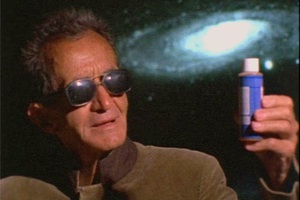 The famously verbose label on a bottle of Dr. Bronner’s Magic Soap is a throwback to the days of the medicine show. In dense blocks of small type that run north, south, east, and west, the label claims that the soap can cure athlete’s foot; eliminate dandruff; wash dishes, upholstery, automobiles, and babies; freshen laundry; serve as toothpaste or shaving lotion; and keep the heart healthy.
The famously verbose label on a bottle of Dr. Bronner’s Magic Soap is a throwback to the days of the medicine show. In dense blocks of small type that run north, south, east, and west, the label claims that the soap can cure athlete’s foot; eliminate dandruff; wash dishes, upholstery, automobiles, and babies; freshen laundry; serve as toothpaste or shaving lotion; and keep the heart healthy.
The copy promises spiritual cleansing as well, in a sort of oddball scripture called the “Moral ABC” that has at times invoked the teachings of Jesus, Rabbi Hillel, Mohammed, Gorbachev, and Mark Spitz. Filled with idiosyncratic capitalization, disorienting syntax, and copious exclamation points, these tiny tracts often conclude with a rousing “OK!”: “Enjoy body rub to stimulate body-mind-soul-spirit and teach the Essene Moral ABC uniting all free in the shepherd-astronomer Israel’s greatest All-One-God-Faith!” Buy the soap, clean yourself, save the world. OK!
The man behind the company, founder Emanuel Bronner, has been dead for 10 years now, and it’s a wonder that a documentary hasn’t been made about him earlier: He’s as much of a character as his signature product implies. Although Dr. Bronner’s Magic Soapbox, which is released on DVD November 13, could focus exclusively on how Bronner got to America and made his soaps into an earth-friendly counterculture staple, director Sara Lamm instead distilled his story to its base essentials and then turned her camera on his children and grandchildren.
The film is ultimately the story of how Bronner’s children survived Bronner. Young Emanuel grew up in a clan of German soapmakers and was trained to join the family business. But father and son clashed, and Emanuel escaped to the United States in the 1920s to seek his fortune. As the Nazis took control of Germany, he begged his family, unsuccessfully, to join him in America. The last young Bronner heard from his father was a simple note: “You were right.” Most of his family perished in concentration camps.
Bronner roamed around the United States and, after shouting his philosophy at a dean of the University of Chicago, was committed to an asylum. Eventually, he escaped, hitching a ride to California, where he formulated the recipe for his soap and a plan to unite mankind. The soaps would go on to make him millions. The philosophy would bring him fame and nearly wreck his family.
By any account, Bronner was a lousy parent. “What’s more important,” he would ask his son Ralph, “saving the world or raising your family?” When their mother, Paula, fell ill and was institutionalized, Ralph, his brother, James, and their sister, Ellen, were shuttled to foster homes and orphanages. As the children grew older, they went their own ways. Fraught with health and mental problems, Ellen was institutionalized. Ralph attended college and helped his father. James grew bitter, joined the Navy, and eventually returned to the fold and helped make soap.
He never embraced his father’s philosophy and used to complain about “that whole God thing,” as he described the Moral ABC. James has since died, and Ralph now runs the company with two of James’ sons and keeps his father’s legacy alive. He hasn’t changed the company much, though the labels have reined in some of their far-flung rhetoric and have stopped suggesting that Vaseline, lemon juice, and Bronner’s peppermint soap are an effective birth control method. The company’s website claims that “while we disagree with Dr. Bronner on some idiosyncrasies in his philosophy, we revere him for his efforts to unite humanity.”
It is easy to make the life of a crackpot entertaining; it is much more difficult to make a story like this one ring with honest emotion. But Lamm is up to the task, following Ralph around as he spreads his father’s gospel and extols the myriad joys of their soaps. He’s revealed as part Spalding Gray performance artist (he tells his father’s story in front of a giant label, to off-off-Broadway crowds), part pitchman, and part evangelist. Soft-spoken and empathetic, he emerges as a deeper and more sympathetic character than his father.
At one point, Lamm captures Ralph at his Milwaukee hotel, befriending a tattooed punk who says he loves the soap’s tingle, accepts some free soap, and later plays a tune on his electric piano, a dirgelike melody for his dying girlfriend. Watching Ralph comfort him, and later speak on a New York stage, it is obvious that he has taken his father’s teachings to heart. “We’ll work-sing-dance-love, marching on! Marching on!” the Bronner’s label exhorts.
While Emanuel tried to save the entire world, Ralph walks the streets of Times Square, downtown Milwaukee, and Southern California with a bottle of soap, a song, or simply a hug, spreading the Moral ABC and marching on, marching on.
This article originally appeared in The Utne Reader.
